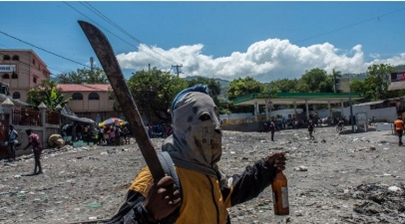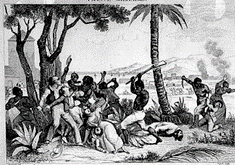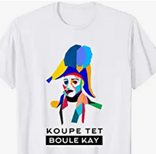Rejecting 'Koupe Tet Boule kay' during street protests
Should we ban the slogan "koupe tèt, boule kay"?
an op-ed by Belizaire Vital
Advisor to the board of HAMREC
***************************
For many years Haiti has had to journey across difficult moments to establish its own identity as a nation. It was never a secret that powerful interests have conspired and continue to collude to maintain the status quo on the west side of the island of Hispaniola. The powers that be often do and undo anything they want in the tiny, barely 27,560km2 piece of land.
On September 17, 2022, in one vivid chaotic scene on world media, everyone could see how unscrupulous individuals in the streets burned tires and entered homes to grab household items. These images are a violent expression of discontent around the untimely decision of Ariel Henry's regime to cut fuel subsidies. When it goes into effect, it will dramatically increase energy costs and thereby affect practically every critical sector of the economy, including transportation, electricity, agriculture, manufacturing, healthcare, and a whole host of other services.
Supporters of the protests yelled the famous phrase, "koupe tèt boule kay." It is a battle cry known only in Haitian circles. We all know that this kind of incitement can be hazardous.
 The Haitian phrase "koupe tèt boule kay" literally means "behead and burn houses." To some, it can simply mean "kill and burn everything." It does not specify the who, what, where, when, or even how. In the ears of the dispossessed and the violent individuals, it can incite carnage and put in danger many innocent lives.
The Haitian phrase "koupe tèt boule kay" literally means "behead and burn houses." To some, it can simply mean "kill and burn everything." It does not specify the who, what, where, when, or even how. In the ears of the dispossessed and the violent individuals, it can incite carnage and put in danger many innocent lives.
This opinion piece does not counter revolting against the unbearable economic situation in Haiti. It is simply a plea to leaders on the ground and in the diaspora to show more restraint in using the slogan as a call to action. It also analyzes the emotional and motivational aspects of the constant protests.
Problem we see
Peaceful marches, sit-ins, riots, and pillaging are different forms of protesting the sociopolitical and economic situation of the country. A large sector of the population is no strangers to a long list of claims that arguably justify street protests.
Ariel Henry, who took over as the nation's prime minister in July 2021, has had trouble uniting the populace. Gang activities are rampant. His election delaying tactics are there to see. Everyone can readily tell that it is intentional. Besides, he is in legal jeopardy over the death of former president Jovenel Moise and may end up being indicted by a successor government that he is not an affiliate. The decision of his administration to cut fuel subsidies may have come at the wrong moment. However, is "koupe tèt, boule kay" the answer in this modern era?
Historical Precedence
The politics of burning buildings and killings in the street resulted from a well-known slogan in Haitian history, where Dessalines urged the enslaved people to kill and burn every French. Since then, we have been burning houses and resorting to violence to end a cycle for those in power  that we do not favor. "Koupe tèt, boule kay" was made for an era when slavery was at the height of the inhumane treatment of one group of individuals by another. It came when there was a clear linear demarcation of power, status, and race. It came as a strategy and a weapon of choice because the enslaved people did not have powerful rifles and bayonets to counter their oppressors. They had to resort to a handful of tactics, including religious rites, poisoning, and extricating themselves into the woods to hide from forced labor, also known as "Marronage."
that we do not favor. "Koupe tèt, boule kay" was made for an era when slavery was at the height of the inhumane treatment of one group of individuals by another. It came when there was a clear linear demarcation of power, status, and race. It came as a strategy and a weapon of choice because the enslaved people did not have powerful rifles and bayonets to counter their oppressors. They had to resort to a handful of tactics, including religious rites, poisoning, and extricating themselves into the woods to hide from forced labor, also known as "Marronage."
There had been moments of peace and unity. However, the nation has had more turbulent times than were necessary. There is a long history of images of machetes, fires, tires burning, and the destruction of buildings for pillage. There have even been stories of library burning and neighborhood mass killings. These behaviors persist until today as a so-called weapon of choice against oppression and against the inept inability of Haiti's leaders to respond to the basic economic needs of the population.
In his famous book "The Black Jacobins," CLR James argues that Haiti's aftermath of the 1804 massacre created more pains than gains. We must separate the Dessalinian era and what Haiti is currently journeying across. Sordid looting and images of burning can only instill disgust among those who wish to visit Haiti on a tourism journey.
Visceral acts
Humans are complex beings born with innate emotions that we learn to control over time as we grow into adulthood. We can cite love, hate, pity, fear, disgust, anger, pride, sadness, misplaced belief, and many others. Anger  expression can have destructive and uncontrollable consequences for the subjects and their surroundings.
expression can have destructive and uncontrollable consequences for the subjects and their surroundings.
Some of these protesters we see on TV act viscerally in many cases. They exhibit instinctive and elemental sets of emotions based on deeply seated feelings that cloud their judgment. These emotions are stronger when the individual has spent all his life at the bottom of Maslow's pyramid of needs.
People in a visceral state tend to discount the significance of other objectives and concentrate mainly on those connected to their present condition.
Political and commercial motives, or window of opportunity for thieves
in our current time, "Koupe tèt boule kay" represents a visual method of causing terror in individuals who get in the path of the general welfare. It serves as a reminder that the populace will persist in using brutal force to express their displeasure, even if it results in self-harm. The peaceful protesters, in contrast, wish only to send a message through the media, asking the government to do its job. The rioters are more violent individuals and are out to destroy the means of the elite to generate an income for themselves. They see medium and large businesses as centers of cheap labor exploitation that must pay their fair share of taxes and income redistribution. Finally, the looters are opportunists that see a window to rob amid the pandemonium caused by a street uprising. They use the protests as a perfect vehicle to steal merchandise they will later resell on the black market. Furthermore, they often dispossess anyone in their paths, even poor merchants.
Hunger and poverty can lead people to behave unseemly in some cases. The poor and uneducated are easily manipulated by those more astute on top.
In Haiti, we have a predatory ruling system where the opposing teams are always ready to pounce and replace the incumbent regime with the same caliber of a sordid and corrupt cabal. In other words, opposition leaders support these lootings because they want to take advantage of the situation to gain access to power and continue their "overt" pillage of the country. (Ôte-toi de là que je m'y mette)
There is no concrete proposal for organizing the upcoming election. Electoral campaign from many political leaders is eerily inexistent. No platform in sight that offers a solid path forward. All we see is an incitement to burn whatever protesters can find with the hope that the actual actors in power will leave their posts.
Solutions
We know what the problems are. We are either disingenuous or wicked that we cannot seek a solution that would satisfy most of the population's needs. Our politicians have lost respect for all societal norms. Their behaviors mimic a sample of the cultural establishment they are used to in their upbringing. As leaders, they have not yet attained a level of judgment, courage, and integrity that would lead them to possess emotional capital and charisma. They look at being in power as someone who is there to make money, pursue fame (and then fall into infamy), and destroy the career and the lives of those who do not follow them.
Taking advantage of chaos can lead to anarchy. Pillaging occurs when nobody is looking and everyone is preoccupied with heightened stress, anxiety, and anger. The so-called leaders of the civil society who are not in power are waiting for their turn to loot the country until they also get sacked by "kill and burn." It is a vicious cycle that will continue for more decades to come. It is a dereliction of duty. It is akin to sacrificing ordinary people as pawns in a losing chess game.
To have a true revolution, a leader must institute and convince the mass of a long-term goal after they replace the ruling party. A revolution is a planned and orderly wider-scale endeavor. What we are witnessing in the streets of Port-au-Prince is a localized and disorganized revolt that will end quickly and fade into oblivion.
Part of the solution is to Allow the diaspora to have local representation. Implement new or reinforce existing institutions that can withstand the test of time. Provide financing for news coverage that equally focuses on investigative journalism to report on the looting of the country's resources by the top 1% in Haiti, just as they do with the reporting of street looting by ordinary folks. We say yes to peaceful protest. No, to violence. Yes, to massive election participation.
The recommended solution is to establish permanent institutions with the power to control the executive branch's actions. It is time for our leaders to put in place the institutions that can safely remove from power those who are stubborn and foolish enough to violate the constitution and those who attempt to lead the country on a path that does not lead to progress.
The individuals in charge of Haiti will never care about ending the situation unless the three branches of government are completely separated, and the incentive for immediate and excessive financial gains no longer exists. Any solution not based on true transparency and balance of power will only be temporary or futile.
***************************
- Created on .